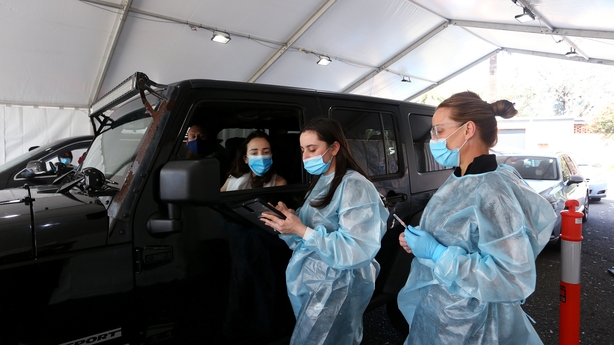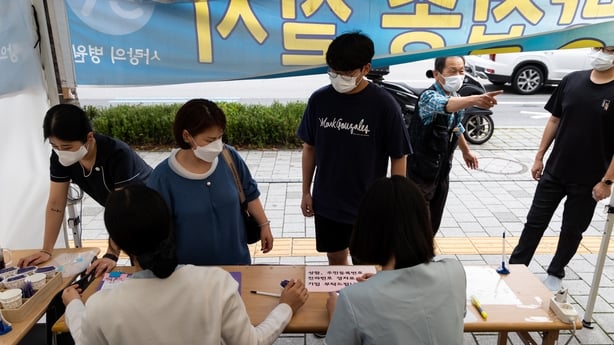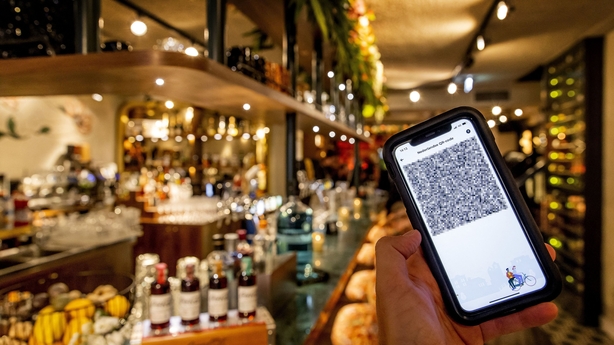Russia has reported more than 900 daily coronavirus deaths for the first time, as the country struggles with stubbornly high infection rates driven by the Delta variant and low vaccination take-up.
A government tally recorded 929 Covid-19 deaths in the past 24 hours, Russia's highest daily virus death toll since the outbreak of the pandemic.
The new figures bring Russia's total deaths from coronavirus to 212,625 - the highest toll in Europe.
The world's fifth worst-hit country with more than 7.5 million infections, Russia has seen cases climb since August as vaccinations stalled.
While several Russia-made jabs have been available for months, authorities have struggled to inoculate a vaccine-sceptic population.
Independent polls show that more than half of Russians do not plan to get a shot.
As of today, just under 30% of the population had been fully vaccinated, according to the Gogov website, which tallies Covid-19 data from the regions.
The surging infections have come without any real pandemic restrictions to limit the spread, but several regions have re-introduced QR codes for access to public places.
But Moscow - the epicentre of Russia's outbreak - has so far withheld from bringing back restrictions.
Authorities say that the highly contagious Delta variant now accounts for all of the cases in the Russian capital.
Independent experts have accused authorities of downplaying the severity of the outbreak.
Under a broader definition for deaths linked to the coronavirus, statistics agency Rosstat reported in August that Russia had seen more than 350,000 fatalities.
Australia reports easing in new Covid-19 cases as vaccinations rise
New daily Covid-19 cases in Australia's Victoria and New South Wales states, the epicentres of the country's worst virus outbreak, have fallen as authorities look to start easing tough restrictions amid a rise in vaccination rates.
A total of 1,420 new locally acquired cases were reported in Victoria, most of them in the state capital Melbourne, down from a record 1,763 yesterday.
Eleven new deaths were registered, the state's highest daily number in the current outbreak.
Melbourne has been in lockdown since 5 August as Australia grapples with a third wave of infections fuelled by the Delta variant that has also put millions in Sydney, its largest city, and the capital Canberra, under strict stay-home rules. Most other states have zero or low cases.
Victorian authorities plan to relax some tough restrictions once 70% of the adult population is fully vaccinated, expected later this month. More curbs will be eased at 80%.

In neighbouring New South Wales, Sydney is due to exit lockdown on 11 October, after a rapid vaccination programme.
About 68% of the adult population has been fully vaccinated in the state, with the number expected to reach 70% by Thursday.
Daily infections fell below 600 for the first time in more than seven weeks today.
Newly elected state Premier Dominic Perrottet said he would "raise a number of issues" about the state's reopening plans at a meeting with health officials.
"Whatever we do, we want to make sure it is done in a way that keeps people safe ... but ultimately, it is important to get people back into town because we want to breathe life into Sydney," Mr Perrottet told radio station 2GB.
Australia's infection numbers are lower than many comparable countries, with around 117,800 cases and 1,379 deaths.
Increased vaccination levels have kept the death rate in the current Delta flare-up below last year's outbreaks.S Korea to offer Covid-19 vaccine to pregnant women
South Korea will begin taking reservations for coronavirus vaccines from pregnant women this week as the country accelerates its inoculation drive to reach its goal for immunising 80% of all adults by the end of the month.
Health authorities see pregnant women as key to the campaign and sought to drum up participation through public notices and news conferences saying they have a greater possibility of serious illness and death if infected with Covid-19.
Pregnant women are eligible to sign up for a shot starting in Friday, for inoculation set to begin on 18 October
18 using Pfizer or Moderna vaccines, according to the Korea Disease Control and Prevention Agency (KDCA).
"The vaccines are safe for pregnant women and can meaningfully decrease their risks of contracting COVID-19 and becoming critically ill," KDCA director Jeong Eun-kyeong told a public briefing.

Of the 731 pregnant women infected with the virus in South Korea as of August, about 2% of them developed serious illnesses, more than six times that of women aged 20-45, according to the KDCA.
But officials have advised people with shorter than 12 weeks pregnancy to consult medical staff before getting a shot.
The government also plans to begin vaccinating children aged 12-17 next month, and providing booster shots for people aged 75 or older and other priority groups next week, including those who live or work at nursing homes and care facilities.
The KDCA reported 2,028 cases for yesterday, as the numbers resurged after the Korean thanksgiving Chuseok holidays.
But the ongoing wave has seen far fewer serious infections than earlier outbreaks, with many older and more vulnerable people having received vaccines.
Critical cases hovered around 350, and total infections rose to 323,379, with 2,536 deaths.
Poland's daily Covid-19 cases up by 70% past in week
Poland's daily Covid-19 cases have risen by around 70% in the past week to over 2,000, a government official said, warning the country that a fourth wave of the outbreak is gathering pace.
Poland's health service was stretched to its limits in the spring by a third wave of the pandemic that saw daily cases exceed 35,000, but authorities believe vaccinations will help control the number of infections this autumn.
"Today's data is a very fast flashing red light," Waldemar Kraska, a deputy health minister, told public broadcaster Polskie Radio 1, adding that there were 2,085 cases reported today.
"This is the last moment when we should get vaccinated, because the fourth wave is definitely accelerating, and in those regions where the number of vaccinated people is the lowest."
Poland has seen the pace of its vaccination programme slow in recent months, and many people in rural southern and eastern regions have decided not to get vaccinated.
However, Mr Kraska said the government was not planning to return to the large-scale restrictions on public life seen during previous waves of the pandemic.
"We do not plan any restrictions on the economy, if we do, we will pinpoint them, on the level of counties, towns," he said.
Dutch court dismisses call to scrap 'corona pass' regulations
A Dutch court has dismissed a call to scrap the 'corona pass' required to enter restaurants, bars, museums, theatres and other public places in the Netherlands.
The court in The Hague said the government had the right to demand proof of a Covid-19 vaccination or a recent negative coronavirus test to limit the spread of the coronavirus as mos tother social distancing measures were lifted last month.
It said the government had made it convincingly clear that unvaccinated people have a higher risk of a coronavirus infection and of infecting others.
It dismissed the claim by opponents that the rules discriminated against those unwilling or unable to be vaccinated.

"So far, it is not clear that there is a difference in treatment for which no objective, reasonable reason exists," the court said.
The government introduced the corona pass late last month, despite strong opposition in parliament, as Prime Minister Mark Rutte said it was needed to prevent a new wave of infections.
Workplaces are not included in the scheme.
New coronavirus cases in the Netherlands rose 2% in the week through to yesterday, to 72 per 100,000 of the population, while the number of new Covid-19 patients in hospitals remained stable at the lowest level in months.

